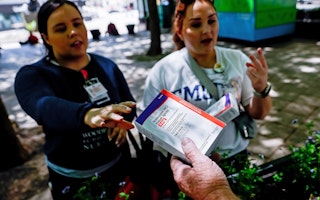The debate over drug enforcement policy in the United States is almost always framed in stark terms premised on narrow options. Conventional thinking about criminal justice issues—prison, community corrections, probation, or possibly some sort of diversion program for minor offenses and first-time offenders—has not worked, nor has it abated the addiction problem. Drug courts have swept the nation without much debate or input from the criminal defense bar. That input is long overdue.
This Open Society Foundations-supported report seeks to redefine the debate by challenging the fundamental criminal justice lens through which drug-related issues are evaluated. Because "the definition of the alternatives is the supreme instrument of power," accepting the criminal justice paradigm legitimizes drug courts while ignoring other smart, fair, effective, and economical approaches.
The report also summarizes the history and evolution of drug courts, evaluates their operation and effectiveness, makes an overarching recommendation on the treatment of addiction, and offers a number of recommendations to ensure that the procedures and practices in drug court comply with constitutional and ethical norms.
Download
-
America's Problem-Solving Courts: The Criminal Costs of Treatment and the Case for Reform (1.73 Mb pdf file)
Download the complete report.
Read more
Harm Reduction for All
A Lifesaving Loan: A New Investment to Help Curb the U.S. Overdose Crisis

For over a decade, the small Remedy Alliance nonprofit has revolutionized providing lifesaving healthcare for people who use drugs. Our new investment will help the group increase access to the overdose antidote naloxone.
Drug Policy
Three Decades of Drug Policy Reform Work

Over the past 30 years, Open Society has been the largest philanthropic supporter of efforts to reform drug policy and promote harm reduction around the world. This is a timeline of the Foundations’ pathbreaking work.
WAR IS OVER?
How the United States Fueled a Global Drug War, and Why It Must End

As U.S. domestic drug policy reform gains momentum, it is time the United States makes a concerted effort to de-escalate the failed war on drugs elsewhere.
